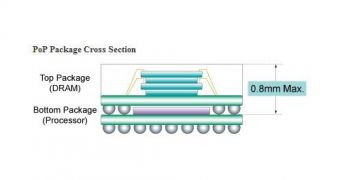Amidst all announcements and rumors surrounding mobile devices, Elpida came forth to announce its newest mobile memory, one that it proudly says is the slimmest to ever be made.
The market for mobile devices is one that pretty much every analyst believes will grow at a brisk pace over the next years.
Of course, the way nearly half a dozen tablet news seem to emerge every single day, on average, this is long past the point where it surprises anyone.
Either way, this is, naturally, an extra cause for makers of memory to put effort into making newer and more advanced chips.
In this instance, it is Elpida that has come forth to boast about having completed the development of mobile memory chips with four layers of 2 Gb (gigabits) memory, these being the thinnest so far.
The company is the same one that may or may not be in talks with Micron in regards to a partnership, though this has little bearing on the matter at hand.
The 4-layer DDR2 mobile DRAM chips that will enter volume production in the third quarter has a thickness of 0.8mm.
It should be just what high-end smartphones and future tablet devices need, although, naturally, the fourth quarter is the earliest when one can expect any of them to surface in any shape or form.
“Given the 1.0mm thickness of previous four-layer PoP made by Elpida and competitors, customers have been using two-layer 0.8mm packages. Thus, for systems that needed an 8-gigabit DRAM density at 0.8mm thickness, the solution has been two layers of 4-gigabit products. But now that a four-layers of 2-gigabit products increases the choices, more flexible system design is possible,” said Elpida Chief Operating Officer and Head of DRAM Business Unit Yoshitaka Kinoshita.
“Based on this new technology for mass manufacturing thin PoP products, which brings together Elpida's small chip Mobile RAM technology and Akita Elpida thin-chip processing and molding technology, a four-layer 0.8mm ultra-thin package has been achieved. Also, the yields and cost are the same as for existing 1.0mm products. The next step is an ultra-thin 0.8mm PoP consisting of four layers of 4-gigabit products.”

 14 DAY TRIAL //
14 DAY TRIAL //